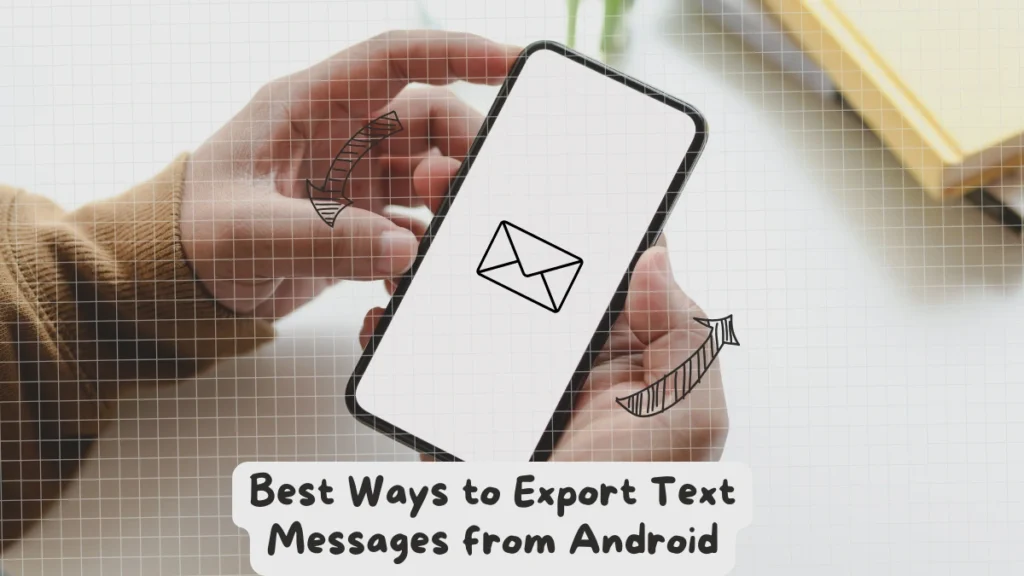Text messages are a treasure trove of important information. They contain everything from sentimental conversations with loved ones to critical details about appointments, work, and even legal matters. However, they’re stored on your phone, which isn’t always the safest place. Phones can break, get lost, or suffer software crashes, leaving your messages vulnerable. Exporting text messages ensures that you have access to them when needed, no matter what happens to your device.
Why Exporting Text Messages Matters
Your text messages are more valuable than you might think. Imagine losing cherished messages from loved ones or crucial details about a business deal. Exporting them provides peace of mind by creating a backup you can access anytime. It’s also helpful when switching to a new phone or if you need proof of conversations for legal or personal reasons. Ensuring you have a record of your texts can save you from future headaches and regrets.
Methods to Export Text Messages
There are several methods available for exporting text messages. Whether you prefer using built-in features, third-party apps, or transferring messages to your computer, there’s an option for every situation. Let’s explore these methods in detail.
Using Built-In Features on Your Phone
Most Android devices come with built-in tools that make data backup simple. These features, while convenient, may have limitations, especially if you’re looking for detailed control over how your messages are saved.
Exporting Messages with Google Backup
Google Backup is a feature built into Android devices that helps keep your data safe. Here’s how to use it for text messages:
- Open the Settings app on your Android device.
- Navigate to Google and select Backup.
- Ensure the Messages toggle is turned on.
- Tap Back Up Now to sync your messages to your Google account.
Once backed up, your messages are stored in Google Drive and can be restored on another device.
Limitations:
While Google Backup is reliable, it doesn’t allow you to export messages individually or view them easily on your computer. It’s ideal for transferring all your data but lacks flexibility for specific needs.
Third-Party Apps for Exporting Text Messages
If you want more control over how and where your messages are saved, third-party apps are a great solution. They offer user-friendly features and support various formats, making it easier to access your texts.
SMS Backup+
This app is a favorite for exporting messages. It links directly to your Gmail account, making backups seamless. After installation:
- Open the app and sign in with your Google account.
- Grant the necessary permissions.
- Back up your messages to Gmail, where each conversation is stored as an email thread.
This method ensures your messages are easily accessible in your email inbox.
SMS Backup and Restore
This app provides even more options for exporting text messages. You can save them in XML, CSV, or plain text formats. Steps include:
- Download and install the app from the Play Store.
- Open the app and select Backup Now.
- Choose where to save your messages, such as Google Drive or your phone’s internal storage.
This app is ideal if you want detailed control over how your messages are stored and transferred.
Benefits:
- Supports multiple file formats.
- Allows selective backup of specific message threads.
- Perfect for creating readable and printable backups.
Using Email to Save Messages
Sometimes the simplest solution is the best. Forwarding important messages to your email is an easy way to back them up.
Steps:
- Open your messaging app and select the conversation you want to export.
- Use the Share or Forward option.
- Enter your email address and send the message thread to yourself.
The messages will arrive in your inbox, where they can be archived for future use.
Pros:
- No need to download additional apps.
- Messages are stored in a familiar format.
Cons:
- Tedious for exporting large volumes of messages.
- May not preserve the original formatting of texts.
Exporting Messages to a Computer
If you prefer storing your messages on a PC or laptop, there are a few effective ways to do so.
Using USB Connection
A direct USB connection allows you to transfer files from your phone to your computer. However, this method is only viable if your phone stores messages in an accessible file format.
- Connect your phone to your computer using a USB cable.
- Navigate to the folder containing your messages (often within your phone’s system files).
- Copy and paste the files to your computer.
Using Droid Transfer
Droid Transfer simplifies the process with a user-friendly interface.
- Install Droid Transfer on your computer.
- Connect your Android device via USB or Wi-Fi.
- Use the software to export messages as text, PDF, or HTML files.
This method is excellent for creating organized backups that are easy to read and share.
Cloud-Based Methods
Cloud storage services like Google Drive and OneDrive provide a secure and accessible way to store your messages.
Steps:
- Use an app like SMS Backup and Restore to save your messages as a file.
- Upload the file to your preferred cloud service.
Once uploaded, you can access your messages from any device with internet access.
Advantages:
- Ensures your messages are safe even if your phone is lost.
- Accessible anytime, anywhere.
Preparing for Exporting Messages
Organizing Your Messages
Before starting the export process, organize your texts by deleting unnecessary threads. This not only saves time but also ensures you only back up what’s truly important.
Checking for Necessary Permissions
Make sure the apps or tools you use have the required permissions to access your messages. Most apps will prompt you to grant these permissions when you start using them.
Best Practices for Exporting Text Messages
- Back Up Regularly: Set a schedule to back up your messages periodically, so you never lose recent conversations.
- Choose the Right Method: Assess your needs and pick a method that balances convenience and security.

Common Challenges and How to Fix Them
Troubleshooting Issues During Export
Sometimes, an app may fail to export messages due to outdated software or permission issues. Always ensure your apps and operating system are updated.
Dealing with File Format Problems
If your messages are saved in an unreadable format, consider converting them to more user-friendly formats like PDF or plain text. Many apps offer built-in conversion tools for this purpose.
Tips for Keeping Exported Messages Secure
- Encrypt Your Files: If your messages contain sensitive information, use encryption tools to protect them.
- Store Backups in Multiple Locations: Keeping copies on both a cloud service and a physical drive ensures you have a fallback if one fails.
Conclusion
Exporting text messages from your Android phone can save you from potential data loss and ensure important information is always within reach. Whether you use built-in features, third-party apps, or cloud storage, there’s a method for everyone. Regular backups, proper organization, and secure storage will keep your messages safe and accessible whenever you need them.
Read More
https://blogzwave.com/how-to-leave-any-group-chat-on-android-in-seconds/
FAQs: Android Text Messages
How do I export text messages without using an app?
You can use Google Backup or forward messages to your email for a quick and straightforward solution.
Can I transfer text messages directly to a new phone?
Yes, using Google Backup or SMS Backup and Restore makes transferring messages simple.
What is the best app for exporting Android messages?
SMS Backup+ and SMS Backup and Restore are reliable apps with user-friendly features.
Are exported messages stored securely?
Yes, especially if you encrypt files or use secure cloud storage services.
Can I retrieve deleted text messages?
Some apps can recover recently deleted messages, but older ones might not be retrievable.
Important: The information provided here in the post is for general informational purposes only. It should not be taken as professional or any other type of advice. Always seek the advice of a qualified professional before implementing this information on your own. Thank you!
Add Blogzwave To Your Google News Feed


